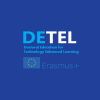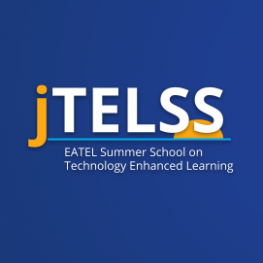Speakers
Luis P. Prieto
Universidad de Valladolid, SpainMaria Jesús Rodriguez-Triana
Tallinn University, EstoniaYannis Dimitriadis
University of Valladolid, SpainTobias Ley
Danube University Krems, Austria and Tallinn University, EstoniaLaia Albó
Universitat Pompeu fabra, SpainYagmur Cisem Yilmaz
Tallinn University, EstoniaStart
23/05/2022 - 16:00
End
23/05/2022 - 17:30
A Happy TEL PhD: Progress, productivity & wellbeing in the TEL doctorate
Monday 23/05 16:00-17:30h
Outdoor Area A
This session is organized by the DETEL Erasmus+ project. 
DETEL is a strategic partnership among nine European universities and EATEL to reflect their expertise in doctoral education into a new study program in TEL, extended with rich and professionally produced OERs.
Abstract
Close to half of the students enrolled in a doctoral program will never finish their dissertation. A similar proportion of them will experience severe symptoms of stress, anxiety or depression. Although many external and personal factors influence these issues, recent research has found that feeling like you are making progress is a common marker of persistence and eventual success in the PhD. Indeed, having a sense of everyday progress is crucial for engagement and employee satisfaction in many knowledge professions.
This participatory workshop aims at making TEL doctoral students aware of these productivity and mental health challenges, and explore research on developing a sense of progress at work, in doctoral studies and elsewhere. We propose a “flipped workshop” format. Online activities are proposed to the participants before the workshop at the JTELSS, to lay down basic concepts and gather participants’ input regarding progress, productivity and well-being issues. The face-to-face session will be dedicated to individual and group-work activities to further develop, personalize and exchange solutions, practices and patterns – by the facilitators, from existing research and experience, or brought by participants themselves.
Needs Analysis
- PhD students (incl. TEL students) have higher chances of dropping out and developing mental health issues than the general population, or students in other educational levels (e.g., Wollast et al., 2018; Leveque et al., 2017)
- A TEL PhD, given its multi-disciplinarity and small size of local research communities, is at a higher risk of isolation, which can exacerbate some of these problems
- The issue of perceiving progress has been marked as an important distinguishing factor of doctoral persistence and work engagement (Amabile & Kramer, 2011; Devos et al., 2017), and would be important to understand for PhD students (especially, beginning ones)
- Many universities lack training actions about transversal issues like productivity and mental health in research (hence, many TEL PhD students may lack the basic knowledge and resources to face some of these challenges during their doctorate).
References
- Amabile, T., & Kramer, S. (2011). The progress principle: Using small wins to ignite joy, engagement, and creativity at work. Harvard Business Press.
- Devos, C., Boudrenghien, G., Van der Linden, N., Azzi, A., Frenay, M., Galand, B., & Klein, O. (2017). Doctoral students’ experiences leading to completion or attrition: A matter of sense, progress and distress. European Journal of Psychology of Education, 32(1), 61–77.
- Levecque, K., Anseel, F., Beuckelaer, A. D., Heyden, J. V. der, & Gisle, L. (2017). Work organization and mental health problems in PhD students. Research Policy, 46(4), 868–879.
- Wollast, R., Boudrenghien, G., Van der Linden, N., Galand, B., Roland, N., … Frenay, M. (2018). Who Are the Doctoral Students Who Drop Out? Factors Associated with the Rate of Doctoral Degree Completion in Universities. International Journal of Higher Education, 7(4), 143–156.
Learning Objectives
- To acknowledge and understand the prevalence and importance of common psychological challenges in a TEL PhD
- To acknowledge and understand the importance of a variety of progress indicators on one’s own engagement with the doctoral process
- To exchange (and experiment with) best practices on how to cultivate a sense of progress, remaining productive and sustaining one’s own well-being
- To realize that such (seldom spoken-about) challenges are not specific to a person (i.e., that you are not alone in facing them – cf. impostor syndrome), based on actual data and face-to-face conversations with peer PhD students and supervisors
Pre-activities
The workshop will follow a “flipped classroom” methodology. Hence, participants (PhD students) will be asked to perform several individual activities BEFORE coming to the actual face-to-face session, which will be crucial to have meaningful discussions and other group activities during the session:
- Watch a short introductory video (7 minutes)
- Answer a questionnaire about the participant’s own wellbeing, productivity and progress in their doctoral journey (15 min)
- Do some light reading (two blog entries, 30 min in total)
Session Description
The face-to-face activities of the workshop will be mostly active and collaborative in nature.
- Icebreakers related to the topic of the workshop (moving around the room/space) (10 min)
- Short introduction/reminder about dropout and mental wellbeing challenges in the (TEL) doctorate, and key concepts to overcome them: progress, serenity, appropriation. (10 min)
- Individual exercise: How are we doing with regard to these key concepts? (5 min)
- Group exercise: Mapping out the challenges in today’s focus area (10 min)
- Short “deep dive” about the focus area (15 min)
- Heatmap voting: the most important challenges (5 min)
- Breakout groups to solve the most important challenges (15min)
- Reporting back to the whole group (10 min)
- Making a personal action plan, and next steps (10 min)
NB: We are still polishing the workshop design, so some of these activities may be slightly modified.
Post-activities
-
- Feedback questionnaire, to understand the effectiveness of the workshop
- Participants will be invited to dive deeper into the concepts/focus areas not touched upon in the session, through resources including:
- The DE-TEL book (section on Wellbeing)
- The “A Happy PhD” blog
- The MOOC “The Science of Stress & Self-Regulation” (by UPF)






